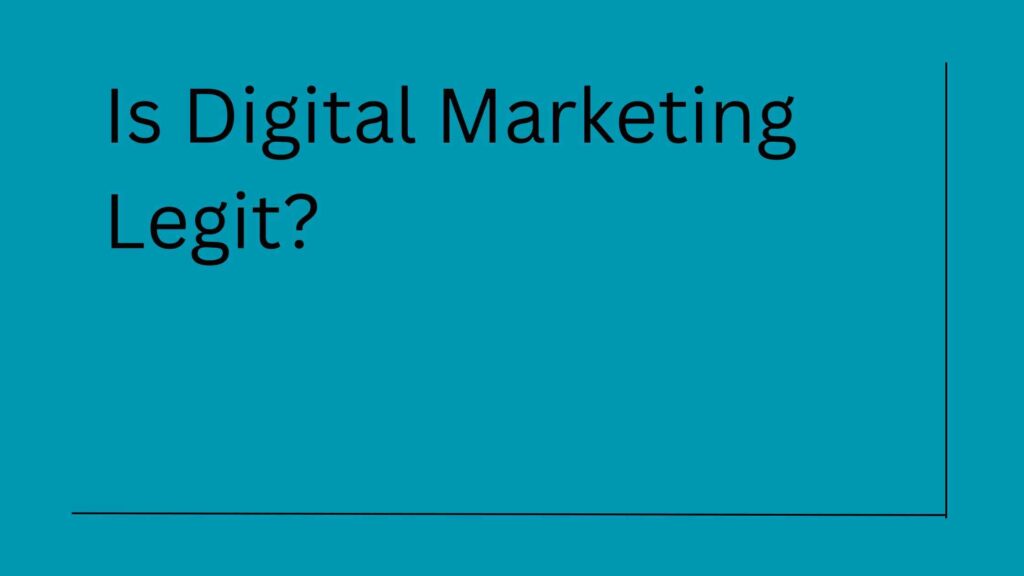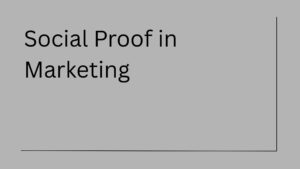Let’s just call it what it is: digital marketing gets a weird reputation sometimes. For something that has exploded across every industry, it still somehow feels… a bit suspect to some people.
Maybe it’s because your inbox is filled with “growth hacking secrets” and “$0-to-$10k-a-month” YouTube ads. Maybe it’s because everyone on LinkedIn claims to be a “digital marketing expert,” and you can’t figure out who actually knows what they’re talking about.
Or maybe it’s just the word “digital” that makes the whole thing sound like some vague, untouchable force. Kind of like magic. Or vapor.
But is digital marketing legit?
Short answer: Yes.
Longer answer: Yes, but also, it depends who’s doing it, what you expect from it, and whether you’re buying into the hype or the actual craft.
Let’s take this apart, piece by piece.
First, What Even Is Digital Marketing?
Let’s not assume we’re all talking about the same thing.
Digital marketing isn’t just ads on Facebook or writing blogs with keywords. It’s a massive umbrella think:
- Search engine optimization (SEO)
- Paid advertising (PPC)
- Email marketing
- Content marketing
- Influencer campaigns
- Social media marketing
- Affiliate marketing
- Conversion rate optimization
- … and honestly, that’s just the shortlist.
If there’s a platform where people hang out online, there’s probably a marketing tactic tied to it.
But here’s the kicker: not all digital marketing looks like marketing. A really well-placed YouTube tutorial, a Reddit comment that feels helpful but links back to a tool, or even a meme with subtle branding? All part of the game.
That’s why some people doubt it. When it’s done well, digital marketing often doesn’t look like marketing. It just feels natural. And when it doesn’t, well, that’s when the skepticism creeps in.
Why People Think Digital Marketing Is Not Legit?
Let’s be honest, some of the bad reputation is earned.
1. Too Many Overnight “Experts”
There’s almost no barrier to entry. You can buy a domain, set up a website, call yourself a digital marketer in a weekend. Maybe even start charging people by Monday.
So now you’ve got a sea of people offering services with no real proof. Some are learning, which is fine. But some are flat-out scamming.
And if a business has been burned by one of those folks? You bet they’re going to tell ten more people that digital marketing is BS.
2. Big Promises, Small Delivery
“Double your revenue in 30 days.”
“10x your traffic guaranteed.”
“Only pay if we rank you #1 on Google.”
Sound familiar?
Now, in theory, bold claims can be good marketing. But when those promises fall flat, and often they do, it’s not just disappointing. It makes the whole industry seem like smoke and mirrors.
3. Misunderstood Expectations
Here’s something no one likes to say out loud: a lot of business owners don’t actually know what digital marketing is supposed to do.
They think hiring an SEO means their phone will ring more. Or that running Instagram ads will somehow boost their physical store traffic next week.
When reality doesn’t match those expectations, people assume the marketer didn’t deliver. But sometimes, the misfire was baked in from the beginning.
So… What Makes It Legit, Then?
Here’s the part people miss: digital marketing isn’t magic. It’s not a switch you flip. It’s not a one-time shot. It’s more like growing a tree than microwaving a burrito.
What makes it legit is how methodical, strategic, and when done right, powerful it is.
It’s Backed by Data
Unlike a traditional way of marketing like ATL or BTL, where the advertisement is made through the billboard or TV commercial, digital marketing gives you feedback almost instantly. You can track who clicked, how long they stayed, where they dropped off, and what convinced them to buy (or not).
This isn’t guessing. It’s experimentation, testing, iteration.
It Builds Momentum
Content doesn’t just disappear. A blog post written today could generate leads for years. An SEO-optimized site can climb the ranks slowly, but stay there with the right care.
In other words, digital marketing compounds. That’s a kind of legitimacy traditional marketing can’t always match.
It’s Where People Are
Like it or not, our lives are online. People research online before they buy. They compare prices. They look at reviews, scroll Instagram, ask ChatGPT for opinions. The idea of an AI like SearchGPT further blurs the lines between searching and direct interaction.
If you’re not marketing digitally, you’re not really in the room.
Digital Marketing: It’s Not Always Fair or Perfect
Now here’s where we can get real.
Even though digital marketing is legitimate, it’s far from perfect.
Search algorithms change overnight. Ad platforms suddenly raise costs. Social media policies shift. It’s an ever-moving target.
And that can be exhausting. Especially for small businesses who don’t have the time or money to constantly keep up.
Also… sometimes, it just doesn’t work.
Maybe the product isn’t a fit. Maybe the audience isn’t online. Maybe the marketer is out of their depth.
There are dozens of reasons why a campaign might flop even if everyone is doing everything “right.”
So yes, digital marketing is legit. But it’s also chaotic. It’s part science, part art, part luck. And if that frustrates you? Totally valid.
Where the Real Digital Results Happen
Now, let’s not just dwell on the messy bits.
When digital marketing clicks, it really clicks.
Here’s what legit digital marketing tends to look like:
1. It’s Strategy-First
There’s no one-size-fits-all playbook. Good marketers start by understanding the business, the customer, the goals, and only then pick the tools.
You might not need Video Marketing. Or PPC. Or a 10,000-word blog post. Strategy means choosing the right weapon for the right war.
2. There’s Patience Involved
The best campaigns often take time. SEO results? Months. Content building authority? Longer.
Quick wins are nice, sure. But the most sustainable success stories are the slow burns. They don’t feel flashy, but they last.
3. It’s Aligned with Sales
This might be the biggest green flag of all. If your digital marketing team doesn’t talk about conversions, revenue, or business outcomes, something’s off.
Traffic is great. Likes are fun. But money in the bank is the real measure.
A Brief (but Honest) Thought on the Marketing Scams Around Digital Space
Okay, let’s pause for a second.
Yes, there are scammy digital marketing agencies. Plenty of them. Ones that take your money, send you reports full of meaningless numbers, and disappear when results don’t show.
So if you’ve ever been burned before, yeah, you have every right to be skeptical.
But here’s the weird twist: those scammers rely on the fact that digital marketing is legit. That’s how they convince people to pay them in the first place.
It’s not the industry’s fault that some bad actors are cashing in on its credibility. But it is a reminder to be careful who you work with. Ask for case studies. References. Real results.
And trust your gut. If something feels off, it probably is.
So… Should You Trust It?
If you’re still asking, “Is digital marketing legit?” the answer is:
Yes, but don’t take it at face value. Ask questions. Watch results. And recognize that like anything worth doing, it takes time, skill, and real effort.
But here’s the good news.
Digital marketing is one of the few fields where small businesses can outmaneuver giants. Where creativity can outshine budget. Where one clever campaign can change the trajectory of a brand.
That’s not just legit. That’s powerful.
Final Thoughts (That Might Contradict Everything Above)
Look, the truth is messy. Some days, digital marketing feels like a cheat code. Other days, it feels like shouting into the void.
One company hits it big from a single viral tweet. Another writes 150 blog posts and barely moves the needle.
So yeah, digital marketing is legit, but it’s also unpredictable. It rewards effort… sometimes. It punishes carelessness… unless you get lucky. And every time you think you’ve cracked the code, the algorithm changes again.
But if you’re willing to play the long game, to stay curious, to test and fail and try again, digital marketing can absolutely work for you.
Not because it’s a miracle. But because it’s real. It’s human. And it’s happening whether you believe in it or not.

The Chief Author and Editor at Intothecommerce. As a seasoned expert in digital marketing, I direct the site’s strategic content and ensure every piece meets the highest industry standards. My insights drive our coverage on SEO, paid media, and cutting-edge marketing technology.





2 thoughts on “Is Digital Marketing Legit? Let’s Break Down the Truth”
The digital way of marketing is the fastest path to reach the target audience; it’s unfair to think that way, in my opinion.
Hey,
I wonder why people still think digital marketing is a scam. Just because there are things happening around very few, it is indigestible for me for them to believe such a poor view.